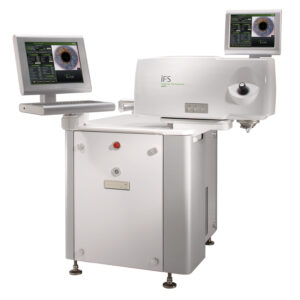Do you have cataracts? Cataracts occur when the natural lens of the eye becomes cloudy, making it more challenging to see. A prevalent age-related condition, more than 24 million Americans over 40 have a cataract.
The only way to effectively treat a cataract is to remove it by having cataract surgery. Your cataract surgeon may recommend cataract surgery if cataracts start interfering with your ability to participate in everyday activities.
Before the day of your procedure, though, there are some things you should be aware of. Keep reading to discover what questions you should ask before having your cataracts removed during cataract surgery!
What Can I Expect During Cataract Surgery?

Cataract surgery is a safe and effective procedure performed on millions of patients annually.
On the day of your procedure, you’ll start by receiving a mild sedative to help you relax. After receiving the sedative, the area around your eyes is cleansed, followed by putting in eye drops to dilate your pupils.
This all happens before entering the surgery suite. Once you’ve settled in, we’ll numb your eyes with eye drops to ensure you won’t feel any pain during cataract surgery. The only sensation you will typically feel is light pressure. The surgery only takes ten minutes or less.
Cataract surgery has an incredibly high degree of accuracy, thanks to ultra-precise technology and microscopic instruments. A tiny incision is all it takes to remove the clouded natural lens.
After removing the natural lens, your new intraocular lens is put in its place. There are no stitches needed, leaving the eye to heal independently.
Will I Need Glasses After Cataract Surgery?

Many patients will no longer require glasses after cataract surgery. However, this depends on the type of intraocular lens you choose before having cataract surgery.
During the procedure, your cataract surgeon removes the clouded natural lens of your eye. They then replace it with a clear, artificial lens called an intraocular lens or IOL.
There are different types of IOLs to choose from. The two general categories are fixed focus and advanced Full Focus® lenses.
Fixed focus lenses used to be the only option. With fixed focus lenses, it is only possible to focus on one point at a single distance.
As a result, patients with fixed focus lenses still have to rely on glasses to see at a near and intermediate distance even after having cataract surgery.
Full Focus® lenses, on the other hand, provide a world of difference. Because they allow the eye to focus at any distance, including up close, far away, and intermediate distances, most patients no longer need glasses.
One of Dr. Dell’s primary areas of research is the development of IOLs to eliminate the need for patients to use reading glasses. In 2001, he performed several procedures using special IOLs that could focus up close and far away. This FDA-sponsored clinical research helped lead to full FDA approval of the first Full Focus lenses in 2003.
Full Focus® lenses can give you unparalleled visual freedom while allowing you to easily do the things you love. At Dell Laser Consultants, we offer a variety of Full Focus® lenses, including the PanOptix, Synergy, Vivity, Symfony OptiBlue, and RxSight Light Adjustable Lenses. They can correct for nearsightedness, farsightedness, and astigmatism.
If no longer needing to depend on glasses and contacts after cataract surgery is a priority, the ophthalmologists at Dell Laser Consultants will discuss your options in detail and recommend the best IOL.
What Is Recovery Like After Cataract Surgery?

You can expect to return home the same day of your procedure. You may be given a protective shield to wear until your cataract surgeon tells you to stop wearing it.
The eye shield protects your eye if you roll over while sleeping. You’ll also need to use eye drops to reduce inflammation and prevent infection.
Most patients start noticing improved vision as early as 24 hours after the procedure. We recommend refraining from strenuous exercise for three days after having cataract surgery, and no swimming for one week.
Although every patient is unique, many find that they can return to their normal routines within a day or two of having cataract surgery.
In almost no time at all, you can look forward to enjoying your clear, cataract-free vision.
Is There an Advantage to Having Laser Cataract Surgery Over Traditional Methods?
One of the most significant modern advancements in cataract surgery has been the development of laser cataract surgery. Laser cataract surgery utilizes a femtosecond laser instead of traditional handheld tools to remove cataracts.

Stitches are typically not needed, unlike traditional cataract surgery. Laser technology gives surgeons increased accuracy and efficiency when removing a cataract. This leading technology has made cataract surgery more effective than ever for over a decade.
Dr. Dell is an expert in laser technology. He has been instrumental in developing and educating other surgeons about it. He was a consultant to the manufacturer of the first FDA-approved laser for cataract surgery.
He also worked closely with the team that developed this laser for several years. When you undergo laser cataract surgery, you are not only benefiting from this state-of-the-art technology.
You are also benefiting from Dr. Dell’s expertise.
Can I Get Cataracts Again after Cataract Surgery?

Once you get cataract surgery, you will not have to worry about getting cataracts again. Cataracts cannot recur once you’ve had them removed.
This is because your eye’s natural lens is removed during the procedure and replaced with an artificial lens. A cataract can’t develop on an artificial lens.
Although you can’t develop cataracts again, you can develop posterior capsule opacification (PCO) following cataract surgery. PCO is when scar tissue forms behind your IOL, causing your vision to be blurry. A simple laser procedure can permanently correct this.
Are cataracts getting in the way of your daily life? Cataract surgery can do more than remove your cataracts: it can transform your vision.
Find out if you’re a good candidate for cataract surgery by scheduling your cataract consultation at Dell Laser Consultants in Austin, TX, today!





